25 de octubre 2023

European Concern over Lack of Academic Freedom in Nicaragua

PUBLICIDAD 1M
PUBLICIDAD 4D
PUBLICIDAD 5D
Diplomats Alba Torres, Mohamed Farrara Lashtar, Maurizio Gelli and Sandy Dávila make up a select club of ambassadors of the dictatorship
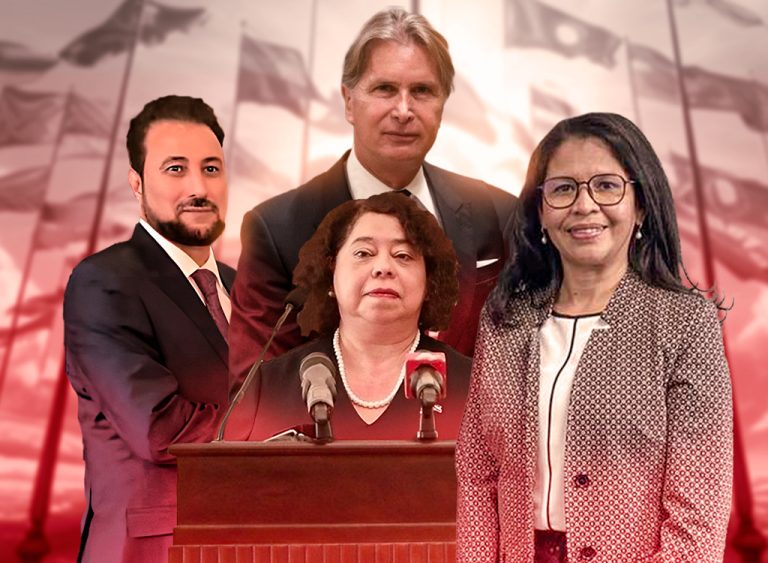
Sandy Anabell Dávila Sandoval was the last Nicaraguan official to join an exclusive club of the Ortega dictatorship: the super ambassadors. Only those diplomats with multiple representations belong to this circle: a minimum of three and a maximum of nine and eleven, so far.
With Davila, there are now four Ortega super ambassadors: Alba Azucena Torres Mejia, Mohamed Farrara Lashtar and Maurizio Cario Alberto Gelli. These officials represent Nicaragua in 27 countries: four as ambassadors with diplomatic headquarters and 23 as concurrent ambassadors.
According to experts in international relations, the accumulation of so many representations in a few hands demonstrates the "capricious" use of the figure of multiple accreditations for concurrent representations, since the appointments do not pursue diplomatic or economic objectives.
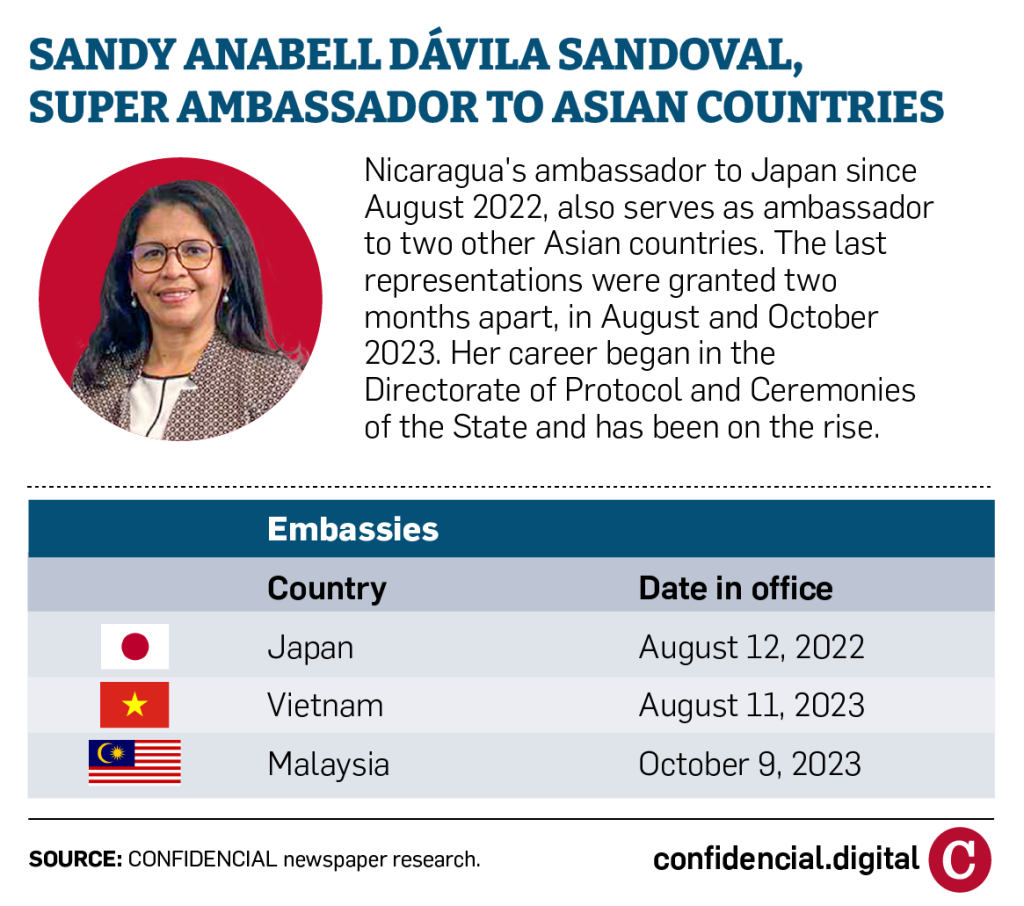
"Concurrent ambassadorships are generally used to solve a government's economic and administrative inability to manage one embassy per country. However, when you have more than three, four or five concurrent accreditations, it is too much for one person and their team in the embassy," explained an expert in diplomatic relations who asked not to be named.
"Diplomatic management requires a lot of investment of time and resources to cultivate contacts and foster good relations between governments. It is difficult for these representatives, who have serious limitations in terms of personnel and budget, to perform as they should," said another international relations specialist.
The specialist pointed out that the Vienna Convention on Diplomatic Relations contemplates concurrent appointments in "two or more States". However, "the question, in this case, is not so much the legality as the capacity" of the diplomat, who must travel once or twice a year to the concurrent country.
"Will a representative from an extremely poor country, with low budgets for diplomatic relations, be able to perform properly with so many other countries in their portfolio?" the expert wondered.
"This makes us think that, in effect, they are nominal and low-intensity representations, except when it comes to seeking voting support in international forums such as the UN General Assembly," he said, answering his own question.
Of the four super ambassadors, Lashtar is the one who handles the most representations, with eleven appointments in Arab countries. He is Nicaragua's ambassador to Kuwait since December 2017, with concurrent representations in ten more countries: Egypt, Algeria, United Arab Emirates, Saudi Arabia, Qatar, Jordan, Tunisia, Turkey, Bahrain and Brunei Darussalam.
Lashtar, nephew of the late Libyan dictator Muammar Gaddafi, is followed by Torres with nine concurrent accreditations. She has been Nicaragua's ambassador to Russia since December 2018, and has concurrent appointments in Armenia, Belarus, Kazakhstan, Kyrgyzstan, Mongolia and Azerbaijan. Added to the list are Abkhazia and South Ossetia, which are states only recognized as such by allies of Russian President Vladimir Putin.
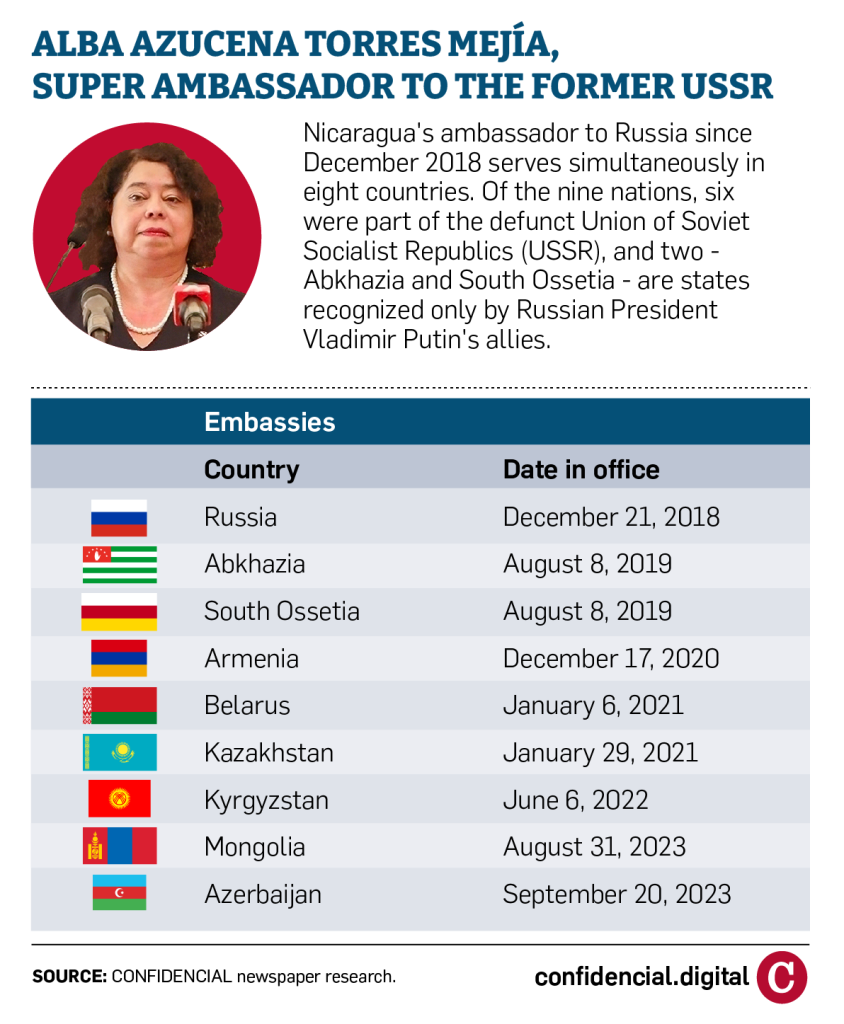
Gelli is Nicaragua's ambassador to Spain since November 2022, and has concurrent appointments in three more European countries: Andorra, Greece and Slovakia. Meanwhile, Dávila is Nicaragua's ambassador to Japan since August 2022, and has concurrent accreditations in Vietnam and Malaysia; the latter representation was granted on October 9, 2023.
According to a former diplomat who requested anonymity, the intention behind the "willingness" to have so many concurrent accreditations is to hide the international isolation suffered by the administration of Daniel Ortega and Rosario Murillo after the massacre of 2018 and the intensification of persecution against critics and opponents.
Of the 27 representations, only two in Lashtar's portfolio –Kuwait and Egypt– were assigned before the 2018 civic rebellion. Of the total, eleven have been assigned in 2023, according to presidential agreements published in the official record La Gaceta, where appointments are published.
"In recent years, Ortega, Murillo, and their accomplices have been condemned and sanctioned internationally for committing crimes against humanity. So they need to pretend that they have diplomatic relations around the world," the ex-diplomat opined.
A specialist in international relations agreed with the ex-diplomat and pointed out that the dictatorship has established these representations mainly with countries not considered democracies, or close to Putin.
"In these concurrent representations, you can see Ortega acting out his conception of himself as an international leader. He believes he plays an important role as a catalyst for anti-American sentiment and his fight against imperialism," the expert commented.
"These kinds of relations," he continued, "are damaging to the country's image, as are Nicaragua's relations with Iran, Venezuela and Cuba, countries that form an ideological axis centered on their anti-U.S. sentiment."
According to analysts, these concurrent representations do not generate any economic or financial benefit to the Nicaraguan population, since trade relations are almost non-existent with most of the countries.
Between January and August 2023, total exports to these 27 countries amounted to $61.2 million, representing only 2% of total foreign sales which exceeded $2.88 billion, according to data from Nicaragua's Online Foreign Trade Administration, formerly known as the Export Processing Center (Cetrex).
Data also reveal that the allocation of these multiple diplomatic accreditations has not had an impact on Nicaragua's exports, since the largest sales come from countries with which there is a long-standing diplomatic relationship. During this period, Spain exported $17.6 million, followed by Japan with $13.6 million. Among the least exports is Russia with $2.7 million dollars.
In terms of imports, the reality is similar: Spain and Japan are the countries that stand out, while in most countries the figure is zero.
"Trade relations are usually one of the main tasks of any diplomatic representation. With countries like Nicaragua, development aid is also a priority, as are university training programs," said an expert in diplomatic matters.
In the area of development aid, of all the countries, only Spain and Japan have provided donations in recent years, according to data from the Central Bank of Nicaragua. Spain donated some $900,000 between 2020 and 2022, while Japan granted $18.4 million in the same period.
"Many of these countries with which Nicaragua has established diplomatic relations have little or no impact on trade, development aid or exchanges for university education. From this, it can be concluded that the objectives are different," said the expert.
Another of the specialists suggested that these concurrent appointments seek two objectives: to "satisfy" Ortega's ally, Putin, who has become the main supplier of repressive manuals and espionage technology, and to "improve the business" of the presidential family and allies.
According to sources, the concurrent appointments given to the super ambassador Torres fulfill the mission of "pleasing" Putin, since most of these relations were established with "puppet governments" of the extinct Union of Soviet Socialist Republics (USSR).
"Ortega and his family are like serfs to Putin. This became quite clear recently when Laureano [Ortega Murillo] offered Nicaragua as a platform for Russia," said one of the experts.
"These appointments are not going to improve the quality of life of Nicaraguans; they are intended to find an outlet for millions of dollars from corruption, because the main markets have been closed to them [the Ortega regime] due to the sanctions," said another analyst, who added that the profile of Lashtar and Gelli reflect this "aspiration."
For a CONFIDENCIAL report, published in March 2023, two diplomatic sources agreed that Lashtar does not serve as a "diplomat", but rather as "an operator for the underground interests of the presidential couple."
"Generally, someone is appointed as ambassador in one country and you have concurrence in another. Lashtar's situation reflects the dynastic character of the current dictatorship. He is seen as the envoy of the family," said one of the informants.
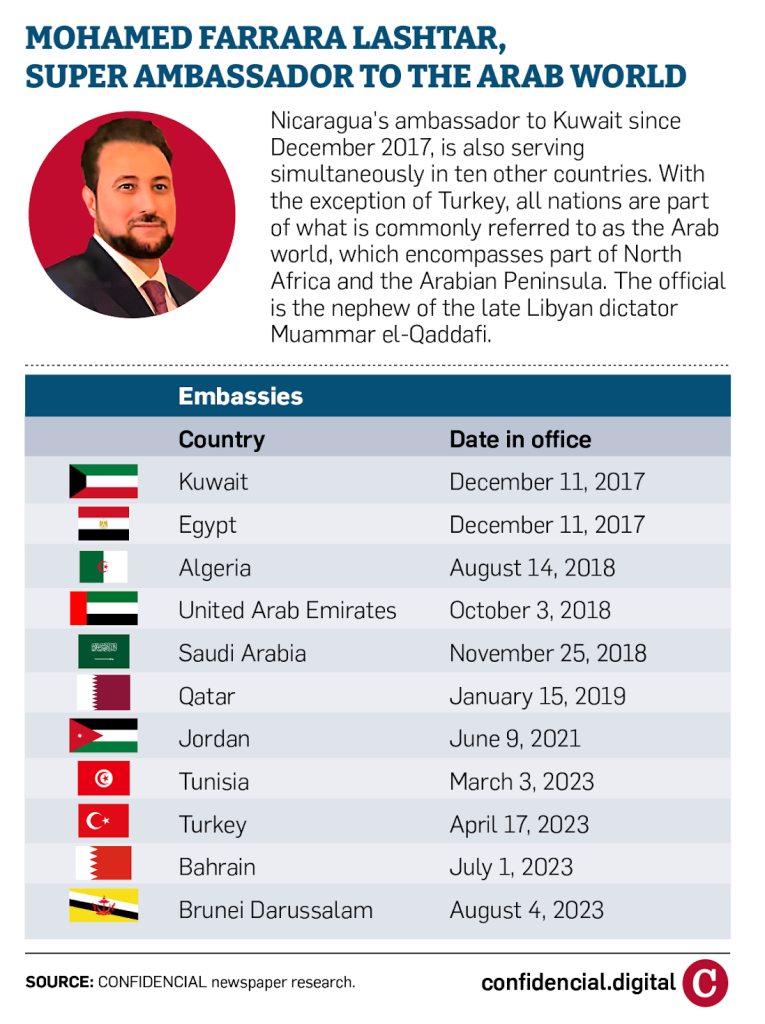
"Since Lashtar is of Arab origin –Libyan, from Maghreb– it supposedly should facilitate Nicaragua receiving more inflows [of resources]. However, I think that instead of looking for money, they [Ortega and family] are looking for where to hide things," he said.
In Gelli's case, he has been accused of attempting to launder the illicit money of his father Lucio Gelli, a former Italian agent accused of anti-communist clandestine operations during the Cold War.
The now deceased father of the super ambassador was also accused of conspiratorial actions during the 1980s in Argentina and financial scandals in Uruguay and Italy, including the bankruptcy of Banco Ambrosiano, a funder of the Contras in Nicaragua.
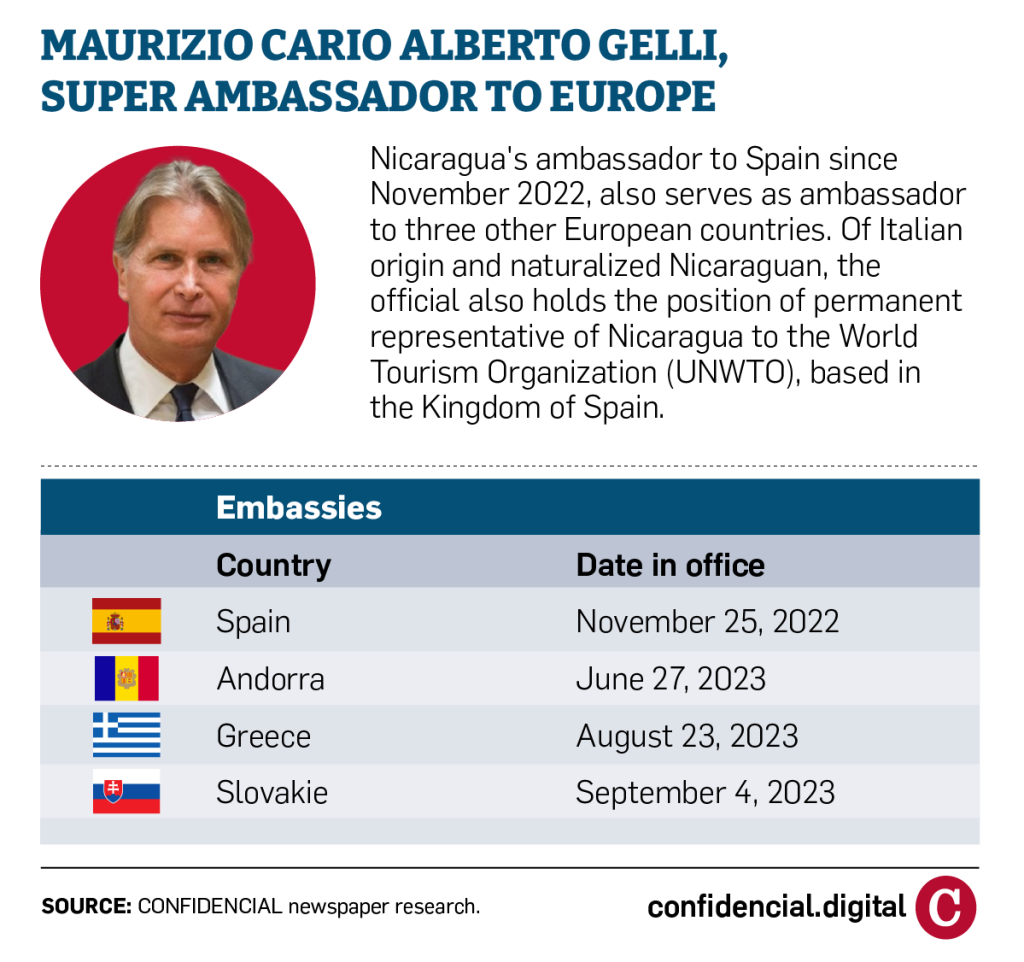
In 1999, the Spanish newspaper El Mundo stated that Maurizio Gelli was suspected by the Italian justice system of attempting to launder money from the illegal $1.2 billion fortune accumulated by his father.
"Of the four officials, two –Lashtar and Gelli– have a defined 'business' profile; one –Torres– is pro-Russia, like the Ortegas. The profile of Dávila, whose family is known to be close to the vice-president, is still unconfirmed," stated one of the sources.
This article was originally published in Spanish in Confidencial and translated by our staff.
PUBLICIDAD 3M
Confidencial es un diario digital nicaragüense, de formato multimedia, fundado por Carlos F. Chamorro en junio de 1996. Inició como un semanario impreso y hoy es un medio de referencia regional con información, análisis, entrevistas, perfiles, reportajes e investigaciones sobre Nicaragua, informando desde el exilio por la persecución política de la dictadura de Daniel Ortega y Rosario Murillo.
PUBLICIDAD 3D